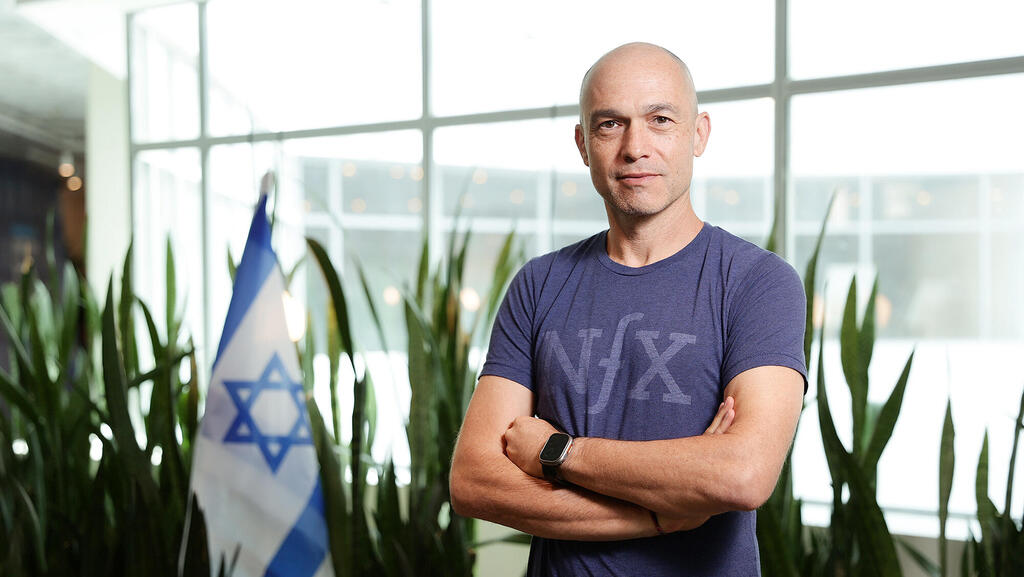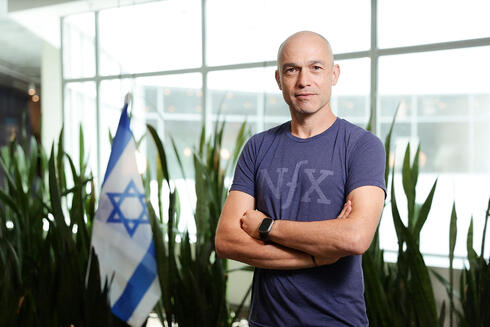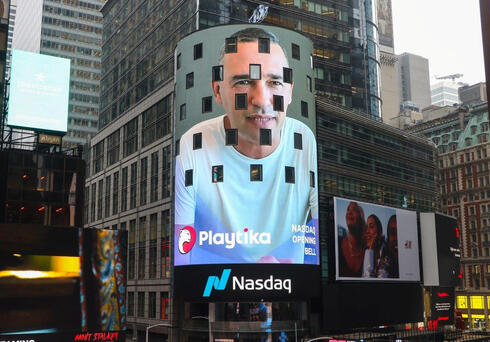
Gigi Levy-Weiss: "Creating jobs is no longer enough to fulfill one’s Zionist duty; we must change the country"
The General Partner of VC fund NFX and one of the most successful investors in Israel, has been busy since October 7th leading the Civilian Emergency HQ, an organization that has already helped tens of thousands of Israelis where the state has failed to do so
The meeting with Gigi Levy-Weiss, one of Israel's successful investors, took place at the office of the Civilian Emergency Headquarters, which looks like a glass aquarium. The view is unexpected: the outdoor space has been converted into a smoking corner for students and teachers from Ort Kiryat Shmona high school, who evacuated to the center of the country and were given half of the HQ’s space to serve as their school. "They are my reality show," Levy-Weiss says with a smile. "I see students playing soccer, and then the ball accidentally hits one of the teachers or breaks one of the lights hanging above, and then the teachers get annoyed. And from their perspective, I'm their reality show - they sit here in the smoking corner and watch me having meetings with people."
The Civilian Emergency HQ, also called the “Brothers and Sisters for Israel,” was established immediately after October 7th, on the foundation of the high-tech protest against the the government’s 2023 attempted judicial overhaul, led by industry leaders such as Levy-Weiss, Founder and CEO of Papaya Global, Eynat Guez, and Co-Founder and COO of Grain, Michal Beinish, along with leaders of the Brothers in Arms protest movement.
"It's the most amazing civilian startup I've ever been involved in founding," Levy-Weiss says. "It was established amid terrible chaos, without knowing what was needed and what could be done, and from the uncertainty, it grew. We were the first to arrive on the scene to understand what was needed and set up a call center to focus requests for assistance by phone. Our 150 coordinators received a budget based on the number of evacuees and took care of food and clothing. We were involved in the evacuation of 8,000 people from their homes, transported 10,000 soldiers to bases, fed 30,000 soldiers, renovated apartments, kindergartens, and a hotel in Eilat; we set up a system of volunteers for agriculture, and of course, we raised donations.
"We moved mountains with a force that no one else had. For example, we needed to fly things into the country, including equipment for the IDF that we bought for tens of millions \[of shekels\]. Eynat Guez said 'Where do you need me?' and I told her there were no flights and I didn't know how to transport everything we had obtained. She went and checked, and within a few days came back to me with a list of all of the planes that could be chartered and those that could be used for free from wealthy Americans."
Related articles:
- Gigi Levy-Weiss: "If we do not push to establish as many new companies as possible this year, we will pay for it for many years to come"
- We visited the Brothers in Arms' "Civilian Emergency HQ" and couldn't believe the magnitude of the activity
- “If the crisis extends longer, it will take us years to reverse the damage”
Isn't it crazy to you that you were the ones dealing with this and not the state?
"I am angry about the failure that allowed October 7 to happen, but not about the initial lack of response from the state, because civilian organizations always react first. The problem is in places where the state is absent. For things that are non-essential or extra, it's okay for others to handle, but in basic things, I expect the state to take the reins, like building a school in Sderot and staffing it with good teachers. We as citizens must not give up on this. Our tax money must be reflected in things that the state must provide."
Six months have passed. Has the state taken control?
"In some areas, professionals, led by local authorities, have indeed stepped in and worked with us. The mayors and municipalities turned out to be true heroes, and gave everything for their residents."
What is the Civilian Emergency Headquarters focusing on now that the situation has settled?
"First of all, it's not accurate to say that the situation has settled, as there are still tens of thousands of evacuees who have not returned home to the north or to the Western Negev. But now the Civilian Emergency HQ is more focused on larger issues like education and employment, and there are dozens of projects in progress. We’re working with municipalities and regional councils on building and refurbishing kindergartens, assisting in education projects in evacuee centers, supporting farmers in the Western Negev and the north, providing grants to small businesses and reservists, and more.
"Besides that, we are in the process of turning the organization into a long-term one with permanent employees, dealing with the reconstruction of the Western Negev, communities in the societal and geographical periphery, also in the north focusing on education, employment, and community. We are exploring with high-tech companies how to create employment opportunities in the Western Negev, and we want to continue to assist in the recovery of these communities."
Is the next step entering politics?
"I don't plan to enter politics. This is my reserve duty. I will never be disconnected from it. Once you get involved, it's hard to get out of it. But I'm not interested in being a politician."
Don't say ‘Brothers in Arms’
The Civilian Emergency HQ began operations based on the administrative structure of Brothers in Arms, the organization of army reservists which led the 2023 protest movement against the government. It was the list of volunteers with Brothers in Arms and their fundraising system that facilitated the rapid organization of the Civilian Emergency HQ. But Levy-Weiss says that from the beginning, the plan was to establish a separate civilian body from Brothers in Arms. Very quickly, donors and beneficiaries also requested to ensure that donations were not politically oriented, so the separation of forces was carried out within a month of the establishment of the Civilian Emergency HQ, and "today everything is separate," says Levy-Weiss.
Did problems arise because you were identified with the protest movement?
"The problem was with the 'client' - the heads of local authorities and various donors, like school principals. We don't hide where we came from and we're not ashamed of our opinions, but we also didn't want to rub it in their faces and say 'Brothers in Arms are helping you.' The Civilian Emergency HQ needs to operate here for many more years - not as a political protest organization, but with the goal of preserving Israel as a democratic and liberal state for generations."
If you have criticism of the judicial reform and the government, why is it important for you to differentiate from Brothers in Arms?
"These are two different organizations: one is a civilian support organization, the other is a pseudo-political organization; it's simply not the same thing. The Civilian Emergency HQ has no value position regarding protests. When you come to rescue people or help farmers, you don't ask about their political views or if they support judicial reform. We are defined as a non-political organization, and that's how we'll remain.
"Now that the protests have resumed, our original link to Brothers in Arms has become a bit of a burden to the Civilian Emergency HQ. On the other hand, since \[Brothers in Arms\] allowed us to build an organization that has a significant impact and can bring 1,000 volunteers to pick apples in WhatsApp groups, so we carry this burden with love."
What do you think about the saga of Mellanox founder Eyal Waldman and the Israel Prize? Education Minister Yoav Kisch attempted to prevent him from receiving the award due to his involvement in the protests against the government, but they finally decided to award it to him after a public uproar.
"Eyal is a friend, a person whom I greatly appreciate and a symbol even before the personal tragedy that befell him (his daughter Danielle and her partner Noam were murdered at the Nova music festival on October 7). NVIDIA (which he brought to the country when it acquired Mellanox) is one of the important centers for the future of the State of Israel and the local high-tech industry. He built technology that is the backbone of the AI revolution. To deprive him of the prize for irrelevant reasons is a badge of shame, a demonstration of arrogance and shamelessness, that this nation doesn’t deserve.
"We need to emerge from the current period as a less polarized country with a government that works for the people, invests in the development of its periphery, strides towards equal rights and responsibilities, creates a new and strong connection with Jews around the world, which has been deteriorating for years, and not a country with no cohesion where the best of its citizens leave."
NIS 20 million within two weeks
Levy-Weiss, 52, is a general partner at NFX, one of the largest VC funds in the world. He co-founded it in 2015 with Pete Flint and James Currier, two serial entrepreneurs who founded 10 companies sold for a total value of over $10 billion. Over the years, NFX has invested in companies such as fintech unicorn HoneyBook, legaltech startup Darrow, and gaming companies Superplay and Papaya. Today, NFX manages assets worth $875 million across three funds. They are also raising $300 million for a fourth fund, a not insignificant move in the current period, as the global tech industry is still in crisis, and in Israel where the judicial overhaul and war have driven away investors.
"Last year was terrible for the Israeli tech industry. It was the worst year by far," says Levy-Weiss. "But it was also a year of significant technological revolution, a change that happens once in a generation: the AI revolution, which will determine the new masters of the world. The big boom of this revolution began in the first quarter of 2023, and a year later we have only a small foothold in this industry."
How was the past year for your fund?
"The first ten months of 2023 were difficult for fundraising, and fewer companies were founded here, so we invested at a slow pace. Then came October 7; a large part of the industry was called up to reserves, and no one was in the mood to start companies, so there simply wasn't anything to invest in. In the last two months, there has been a shift, and we have invested in four Israeli companies: two AI companies, one in digital health and one in gaming. Yet, here we are at the end of the first quarter of 2024 and we are far behind what we expected to see."
As part of efforts to jumpstart the local industry, NFX recently announced the FAST rapid emergency investment track, which allocated $20 million to support new Israeli startups in biotech and AI. This is the second time the fund has initiated an accelerated investment track, having first done so during the COVID-19 pandemic.
"We've created a fast process whenever we want to focus on a sector, where we commit to considering anyone who meets the criteria and allow them to make a presentation. We run a quick preliminary analysis of requests and commit to giving an answer within nine days and money in the bank within two weeks. This can be a good starting point for establishing new companies. Above all, we want to be a signal for the industry, so others see what we're doing, and they’ll be motivated to act. We all need to grease the wheels of the industry. Funds still have money and if we don't invest it in companies there may be no companies to invest in later."
We know that Israel has excellent infrastructure for cybersecurity and fintech, but do you really think there is also infrastructure for 30 groundbreaking AI companies here?
"I don't know if we have such potential in AI infrastructure, companies of the kind that can compete with OpenAI, but definitely there is room for excellent AI-based application companies. In these areas, Israel has a huge advantage. Think about a call management system with AI users or a game whose narrative changes constantly in response to your moves. So yes, I am confident that we have the ability here to build strong teams for certain niches in AI."
What is the role of the tech community in the future of Israel?
"The industry must touch as many populations in the country as possible. The tech industry must be a significant part of our exit from this crisis, because it’s a large part of the GDP, of exports and tax revenues, because it generates numerous jobs, directly and indirectly, and because ultimately it embodies our only relative advantage as a people stuck here in the middle of nowhere with few natural resources."
We saw during the protest against the judicial overhaul and since October 7 that the tech community is much less disconnected from the rest of society as was believed.
"When you're stuck in a startup fighting for its place, it's hard to raise your head, but when your company is already big, or after you've had an exit and the employees are already benefiting from it, at that stage you see social involvement. From the beginning of last year, we saw a much more significant entry of tech in the trenches and I’m very proud of it."
Is there any regret over the days of excess?
"I didn’t really encounter the obscene hedonism here. I did see competition for employees that mimicked what's happening in Silicon Valley, like 'let's offer employees 40 flavors of ice cream, because that's how more people will want to come to us.' It was a bit over the top, but there was a real hiring need. I don't think the situation was terrible in the past, but I am proud of the industry, of my colleagues, and of all the startup workers who work 24 hours a day and still contribute their time and money. We saw insane mobilization on all fronts. The rate of mobilization to reserves from among the tech people was twice that of their share in the population, there were companies with very senior employees in Gaza, or combat pilots who managed their company between flights. People gave a lot of themselves, because everyone understands that being part of this country is not just about enjoying rights, but paying our share."
Pros and cons
Levy-Weiss lives on a moshav in Central Israel with his wife, Daphi Levy-Weiss, Chair of Friends of the Batsheva Dance Company in Be'er Sheva, and their three children. He grew up in northern Tel Aviv to parents who worked for El Al. "My mom had a brother named Giora who was killed in the army, and she wanted to name me after him but not exactly his name," he says. "So on my birth certificate, I was registered as Gigi Giora, and over time, my mom dropped the Giora and left just Gigi. With time, I discovered that a unique name is something everyone remembers. It's great if you're a positive person and really awful if you're a negative one."
In the army, he served as a fighter pilot and later earned a bachelor's degree in business administration from Tel Aviv University and an MBA from Northwestern University. He began his career as an entrepreneur, founding two companies: "The first was an attempt to transfer military technology from Israel to Spain, but it didn't succeed. The second startup was a digital video recording system for hundreds of cameras, where we had a small exit. But the first significant company I founded was Playtika, and that came much later."
In 2003, Levy-Weiss was recruited to Amdocs and was promoted to manage the European and South American division. He then became CEO of 888 Holdings, where he served for four years. Concurrently, he began investing independently in early-stage gaming companies, such as Playtika and Plarium, and software companies like MyHeritage, which later became huge successes.
On one hand, you're a socially engaged person, and on the other hand you're considered a pillar of the gaming industry, which is associated with encouraging addiction and gambling. How does that work?
"In the companies I'm involved in today, there is a focus on 'responsible gaming,' preventing addiction, and so on. But ultimately, there's nothing you can do; every technological development has a downside. Even AI will destroy jobs, which I’m concerned about.
"For many years I sat on Facebook’s advisory board. It's a company that, on the one hand, has created a new and different type of communication in the world, but on the other hand, it serves as a hotbed for problematic political messages, promoting poor body image for children; in everything there are pros and cons. Yet, Facebook or Google will say they only do good, and this statement causes them not to look at all at the negative potential of the technology they’ve developed. At least in the gaming industry there's no hypocrisy. None of the ventures I've invested in thought they were saving the world, but rather providing entertainment, and we need that too."
Why do you invest in gaming even today?
"I always loved games; I'm not a successful gamer, but as a child, I wrote games, and I appreciated their entertaining side. My wife says, 'It's okay to invest in your stupid games so you'll have money to invest in important things like medical technologies.' There's room for the entertainment industry, and there's no need to be ashamed of it. Israel invented gaming, based on algorithms and data, not just creativity. So the industry is important and I helped establish it, so there's also some pride."
"20% of my life is dedicated to the community"
Levy-Weiss has been involved in social activism for years. He was a board member of the Latet organization, which assists low-income families, participated in the establishment of Kama-Tech for integrating the ultra-Orthodox community into the high-tech industry, was one of the founders of MEET - Middle East Entrepreneurs of Tomorrow, which promotes entrepreneurship and cooperation among Palestinian and Israeli youth, and participated in the establishment of Place-IL, which helps integrate underrepresented populations in the high-tech industry, such as residents of the periphery, Bedouins, and Druze. "For years, community involvement has accounted for 20% of my time, and recently, it's been even more."
Why is it so important to you?
"I've always felt very fortunate for everything I've received. My background, the education I received, my military service; all of these were stepping stones, and I felt I needed to give back. Already at the age of 22, I joined the management of a non-profit organization, and over time, I decided to allocate money and time to activities that would narrow the gaps in society through education."
According to Levy-Weiss, even an AI system built for his foundation recognized the increasing weight of his social activism in his life: "Software that we created at the foundation transcribes our conversations and summarizes them for us. In one of the conversations at the Civilian Emergency HQ, I finished a Zoom call with a donor from the U.S. and forgot to turn off the recording. So the software recorded it and sent me a summary by email, mistakenly concluding that I was the entrepreneur, because I tried to solicit donations. So the summary said that my ‘pros’ were that I was ‘an experienced entrepreneur, passionate about the topic, talks at length about the impact his project is going to make, has already shown signs of success,’ and my cons were ‘no sustainable business model, and it's not clear how he can stop being dependent on constant fundraising'," he says, laughing. "The software also added that my focus on Israel creates a small market compared to what interests the fund and that the entrepreneur - meaning me - is too focused on social impact and less on business. Therefore, the recommendation was not to invest."
Last year, Levy-Weiss' social activism also took on a political dimension. Justice Minister Yariv Levin’s judicial reform shocked him, and he became one of the leaders of the high-tech protest against it, organizing demonstrations and signing petitions calling on Prime Minister Benjamin Netanyahu not to intervene in the appointment of judges.
In July, just before the Knesset vote on the amendment to the Basic Law: The Judiciary, Levy-Weiss told Calcalist: "We see the radicalization of the government. A group of zealots and extremists has seized control of Israel and is leading it into an economic and social abyss in an attempt to carry out a regime change via salami slicing tactics. There is an attempt here to bring about a regime change and to violently crush the legitimate and non-violent protest of millions of Israelis who took to the streets. The result, as we already see in the data, will be Israel's transformation into a backward country without high-tech or investments, with a low credit rating, a weak and expensive shekel, and soaring cost of living that will hurt every citizen across the political spectrum. Anyone who cares about this country and its future, regardless of their political views, must tell the government 'enough'."
In the Citizens Emergency HQ, it's important for you to steer clear of politics, but you're very publicly active in the struggle for your political views.
"That's right. Ultimately, this is my country, my home, and my people. Before January 2023, I thought that if you created jobs and established organizations, you fulfilled your Zionist duty. But it has become clearer to me that if I want my children to live here, we need to work to change the country. Otherwise, there are too many bad circumstances which will lead to my children or grandchildren not wanting to be here."
How do you feel about the renewal of the protests during wartime?
"After October 7 there was a feeling that we were all working toward a common goal, that we could put aside our differences because there was a greater threat. The feeling that eats at me now is that we've returned to a place of division and anger from all directions. But I'm not criticizing my friends in the protests, because I know they're doing it out of genuine concern for what's happening in Israel. We need to achieve a renewed mandate for a broad government, which is the basis for anything that can bring a solution. So, I'm focused on that - setting a date for elections. This can remove the conflicts from the streets and transfer them to the politicians."
Why are elections what we need most right now?
"The minimum required is for politicians to face re-election, with the hope that many good people will enter politics. The judicial reform, the abuse of budgets, and the bizarre legislation, all indicate that this isn’t a good government, but we need elections primarily because of the ministerial responsibility for October 7. After a terrible year and four months, Israel needs a broad, unifying government that can make corrections and changes. It's vital for the healing process."


